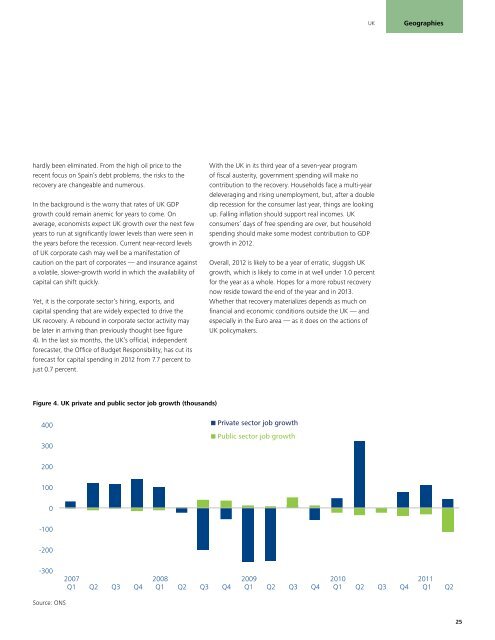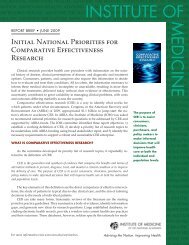You also want an ePaper? Increase the reach of your titles
YUMPU automatically turns print PDFs into web optimized ePapers that Google loves.
hardly been eliminated. From the high oil price to the<br />
recent focus on Spain’s debt problems, the risks to the<br />
recovery are changeable and numerous.<br />
In the background is the worry that rates <strong>of</strong> UK GDP<br />
growth could remain anemic for years to come. On<br />
average, economists expect UK growth over the next few<br />
years to run at significantly lower levels than were seen in<br />
the years before the recession. Current near-record levels<br />
<strong>of</strong> UK corporate cash may well be a manifestation <strong>of</strong><br />
caution on the part <strong>of</strong> corporates — and insurance against<br />
a volatile, slower-growth world in which the availability <strong>of</strong><br />
capital can shift quickly.<br />
Yet, it is the corporate sector’s hiring, exports, and<br />
capital spending that are widely expected to drive the<br />
UK recovery. A rebound in corporate sector activity may<br />
be later in arriving than previously thought (see figure<br />
4). In the last six months, the UK’s <strong>of</strong>ficial, independent<br />
forecaster, the Office <strong>of</strong> Budget Responsibility, has cut its<br />
forecast for capital spending in 2012 from 7.7 percent to<br />
just 0.7 percent.<br />
Figure 4. UK private and public sector job growth (thousands)<br />
400<br />
300<br />
200<br />
100<br />
0<br />
-100<br />
-200<br />
-300<br />
Source: ONS<br />
2007<br />
Q1<br />
Q2 Q3 Q4<br />
2008<br />
Q1<br />
With the UK in its third year <strong>of</strong> a seven-year program<br />
<strong>of</strong> fiscal austerity, government spending will make no<br />
contribution to the recovery. Households face a multi-year<br />
deleveraging and rising unemployment, but, after a double<br />
dip recession for the consumer last year, things are looking<br />
up. Falling inflation should support real incomes. UK<br />
consumers’ days <strong>of</strong> free spending are over, but household<br />
spending should make some modest contribution to GDP<br />
growth in 2012.<br />
Overall, 2012 is likely to be a year <strong>of</strong> erratic, sluggish UK<br />
growth, which is likely to come in at well under 1.0 percent<br />
for the year as a whole. Hopes for a more robust recovery<br />
now reside toward the end <strong>of</strong> the year and in 2013.<br />
Whether that recovery materializes depends as much on<br />
financial and economic conditions outside the UK — and<br />
especially in the Euro area — as it does on the actions <strong>of</strong><br />
UK policymakers.<br />
Private sector job growth<br />
Public sector job growth<br />
Q2 Q3 Q4<br />
2009<br />
Q1<br />
Q2 Q3 Q4<br />
2010<br />
Q1<br />
UK<br />
Geographies<br />
Q2 Q3 Q4<br />
2011<br />
Q1<br />
Q2<br />
25











